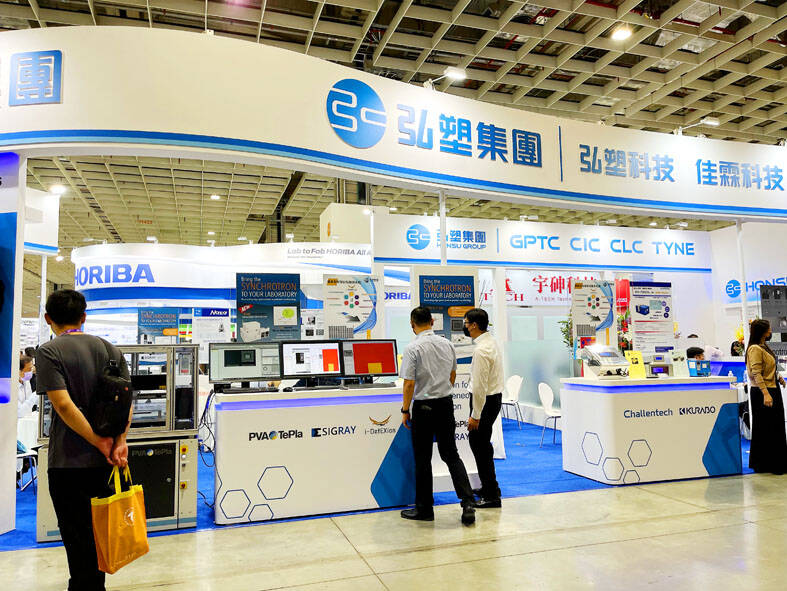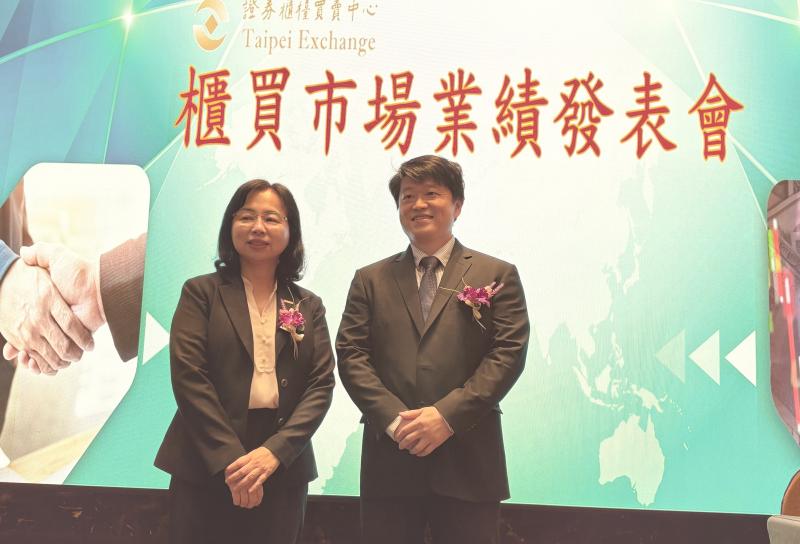Grand Process Technology Corp (GPTC, 弘塑科技), a supplier of advanced chip packaging equipment to Taiwan Semiconductor Manufacturing Co (TSMC, 台積電), yesterday said it can only supply half of customers’ demand through the first half of next year due to excessive demand for artificial intelligence (AI) applications.
The company’s remarks echoed TSMC’s previous comments on robust demand for its advanced chip-on-wafer-on-substrate (CoWoS) chip packaging technology, which is primarily used to package AI chips for Nvidia Corp.
“We expect our factories to continue operating at 100 percent through the first half of next year,” GPTC vice president Travis Liang (梁勝銓) said on the sidelines of an investors’ conference in Taipei.

Photo: Grace Hung, Taipei Times
“Our supply lags far behind customers’ demand,” he added.
Based on customers’ solid demand, the company sees no clear signs of an AI bubble, Liang said.
As the growth momentum for CoWoS equipment is expected to carry into next year, GPTC holds an optimistic view about revenue growth, Liang said.

Photo: Lisa Wang, Taipei Times
Revenue soared about 53 percent year-over-year to NT$4.9 billion (US$155.6 million) in the first 10 months of this year, company data showed.
GPTC supplies semiconductor wet processing equipment for CoWoS packaging technology, including wet benches, wet cleaning and single wafer set processing systems. The company counts ASE Technology Holding Co (日月光投控) and South Korean memory makers among its major customers.
“We believe the company’s operations would continue to thrive over the next three to five years, as reflected in the increases in equipment we delivered,” Liang said.
The company said it is partially bullish about the adoption of new panel-level packaging technology.
GPTC said it has shipped the first batch of equipment for panel-level packaging technology to a customer this year.
The company said it expects to ship more such equipment to customers in the coming months.
GPTC expects shipments to increase mildly next year due to capacity scarcity, Liang said.
The company’s installed capacity is expected to double next year after a new manufacturing facility starts operations in the second quarter of next year, he said.
More capacity expansion plans are under evaluation, he added.
GPTC is jointly developing equipment for new panel-level packaging technology called chip-on-panel-on-substrate (CoPoS), Liang said.
The CoPoS technology, developed by TSMC, is expected to enter volume production in 2028 at the earliest, he said.
The company’s net profit increased 39.8 percent annually, or 47.8 percent sequentially, to NT$303 million in the third quarter of this year. That translated into earnings per share of NT$10.4.
Gross margin improved slightly to 40.7 percent from 40.6 percent in the second quarter, a decline from 48.1 percent in the third quarter last year.
GPTC said it expects gross margin to start picking up gradually after hitting the bottom last quarter.

Shiina Ito has had fewer Chinese customers at her Tokyo jewelry shop since Beijing issued a travel warning in the wake of a diplomatic spat, but she said she was not concerned. A souring of Tokyo-Beijing relations this month, following remarks by Japanese Prime Minister Sanae Takaichi about Taiwan, has fueled concerns about the impact on the ritzy boutiques, noodle joints and hotels where holidaymakers spend their cash. However, businesses in Tokyo largely shrugged off any anxiety. “Since there are fewer Chinese customers, it’s become a bit easier for Japanese shoppers to visit, so our sales haven’t really dropped,” Ito

The number of Taiwanese working in the US rose to a record high of 137,000 last year, driven largely by Taiwan Semiconductor Manufacturing Co’s (TSMC, 台積電) rapid overseas expansion, according to government data released yesterday. A total of 666,000 Taiwanese nationals were employed abroad last year, an increase of 45,000 from 2023 and the highest level since the COVID-19 pandemic, data from the Directorate-General of Budget, Accounting and Statistics (DGBAS) showed. Overseas employment had steadily increased between 2009 and 2019, peaking at 739,000, before plunging to 319,000 in 2021 amid US-China trade tensions, global supply chain shifts, reshoring by Taiwanese companies and

Taiwan Semiconductor Manufacturing Co (TSMC) Chairman C.C. Wei (魏哲家) and the company’s former chairman, Mark Liu (劉德音), both received the Robert N. Noyce Award -- the semiconductor industry’s highest honor -- in San Jose, California, on Thursday (local time). Speaking at the award event, Liu, who retired last year, expressed gratitude to his wife, his dissertation advisor at the University of California, Berkeley, his supervisors at AT&T Bell Laboratories -- where he worked on optical fiber communication systems before joining TSMC, TSMC partners, and industry colleagues. Liu said that working alongside TSMC

TECHNOLOGY DAY: The Taiwanese firm is also setting up a joint venture with Alphabet Inc on robots and plans to establish a firm in Japan to produce Model A EVs Manufacturing giant Hon Hai Precision Industry Co (鴻海精密) yesterday announced a collaboration with ChatGPT developer OpenAI to build next-generation artificial intelligence (AI) infrastructure and strengthen its local supply chain in the US to accelerate the deployment of advanced AI systems. Building such an infrastructure in the US is crucial for strengthening local supply chains and supporting the US in maintaining its leading position in the AI domain, Hon Hai said in a statement. Through the collaboration, OpenAI would share its insights into emerging hardware needs in the AI industry with Hon Hai to support the company’s design and development work, as well